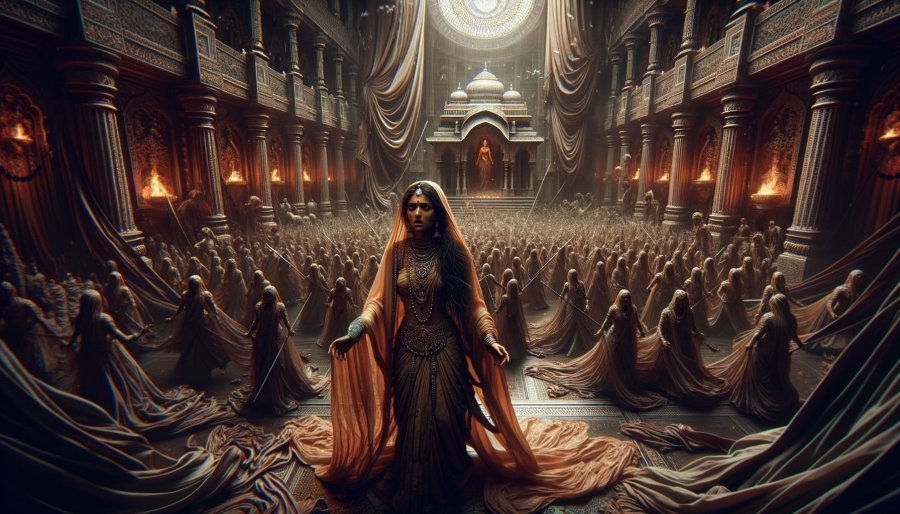Section LXX - Draupadi asks three boons from Dhritarashtra in assembly
Book index: Mahabharata (English)
This page contains a summary of the Mahabharata Section LXX including examples of moral lessons in daily life. The Maha-Bharata is one of the largest epics ever written containing roughly 100,000 Sanskrit verses. It deals with the legendary history of ancient India and contains a large number of interwoven tales.

Short summary of the chapter:
In the assembly of the Kurus, Karna insults Draupadi, calling her a slave after Yudhishthira loses her in a game of dice. Bhima is filled with anger but can't retaliate due to their state of servitude. Vidura condemns the actions of the Kauravas and warns them of the impending calamity brought upon by their sinful decisions.
Arjuna supports Yudhishthira as their master before the game of dice but acknowledges his loss of authority after being defeated. Duryodhana challenges the Pandavas to declare their loyalty to Yudhishthira. Bhima, in a fit of rage, threatens to break Duryodhana's thigh in the coming conflict, showcasing his wrath and determination.
Omens and mysterious sounds signal the impending doom as the atmosphere grows tense. Bhishma, Drona, and Gautama cry out in warning, and Dhritarashtra rebukes Duryodhana for insulting Draupadi. The king, seeking to amend the situation, offers Draupadi a boon to grant her wishes and alleviate her suffering.
Draupadi asks for Yudhishthira to be freed from slavery, ensuring the dignity of their future generations. She then requests the freedom of Bhima, Arjuna, and the twins from their bondage. Dhritarashtra, impressed by her righteousness, offers her a third boon, but Draupadi declines, stating that she does not desire more than what is necessary for her and her husbands.
Through her courage and wisdom, Draupadi navigates the difficult situation in the Kuru assembly, standing up for her rights and the dignity of her husbands. Despite the challenges and insults thrown at her, she remains steadfast in her principles. Dhritarashtra, moved by her steadfastness, grants her boons that ensure the freedom and honor of the Pandavas, setting the stage for the unfolding events in the epic Mahabharata.
Full English translation:
This page is merely a summary which is automatically generated. If you are looking for authentic sources such as the Sanskrit text or the Full English translation of Mahabharata Section LXX - Draupadi asks three boons from Dhritarashtra in assembly, have a look at the following articles:
Section LXX, online text
English translation by Kisari Mohan Ganguli.
Read this and other chapters online.
Mahabharata (English Summary)
by Kisari Mohan Ganguli | ISBN-10: 8121505933
Buy the latest edition:
FAQ of Mahabharata, Section LXX:
Who were the three independent persons mentioned by Karna in the assembly?
Bhishma, Vidura, and Drona were considered independent and critical of their master.
What did Bhima suggest after Draupadi was insulted in the assembly?
Bhima expressed anger and vowed to break Duryodhana's thigh in battle.
How did Yudhishthira respond to Duryodhana's challenge about Draupadi's ownership?
Yudhishthira stated that he lost himself in the game, making him not her master.
What did Draupadi request as boons from King Dhritarashtra?
She asked for Yudhishthira's freedom, the release of her husbands from bondage, and refused a third boon.
Daily life: Draupadi asks three boons from Dhritarashtra in assembly:
The story from the Mahabharata offers a rich tapestry of lessons that can be applied to daily life. At its core, it addresses themes of virtue, responsibility, humility, and the importance of speaking out against injustice. One key takeaway is the idea that one should always act with integrity and consider the consequences of their actions, much like Yudhishthira is reminded of his responsibility and the implications of his decisions in the gambling match.
It also highlights the importance of advocating for what is right and standing up against wrongdoing, even when it is difficult. Draupadi's plight and her questioning of the assembly serve as a powerful reminder to raise our voices against injustice and in defense of those who are wronged. Just as Bhima and Vidura express their disapproval of Duryodhana's and Karna’s actions, it reminds us to support what is right and to work towards correcting wrongs in our surroundings.
Furthermore, the story illustrates the power of forgiveness and the significance of granting boons or chances for redemption, as demonstrated by Dhritarashtra's actions towards the end. This aspect teaches us about the value of mercy and understanding in resolving conflicts and healing relationships. It suggests that, in our daily lives, offering second chances and engaging in acts of kindness can lead to positive outcomes for everyone involved, fostering an environment of compassion and mutual respect.
In essence, integrating these lessons into daily life involves acting with integrity, standing up for justice, practicing forgiveness, and promoting kindness. By embodying these values, individuals can contribute to creating a more just, compassionate, and respectful society.
